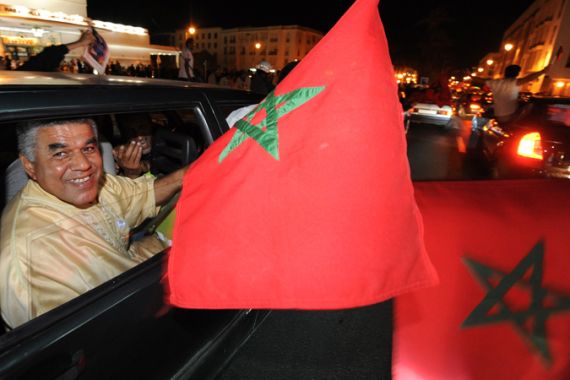Protests called against Morocco reform plan
Pro-democracy activists call for fresh demonstrations, saying the king’s proposals are not enough.

Morocco’s youth-based February 20 Movement has called for nationwide protests against constitutional changes proposed by King Mohammed VI.
The king outlined curbs to his wide political powers in an address to the nation on Friday and pledged to build a constitutional monarchy with a democratic parliament.
Keep reading
list of 4 itemsThe Lost Souls of Syria – Part 1
Is the US shipping weapons to Israel tacit support for its war on Gaza?
Nakba remembered: What is the right of return?
“The national co-ordinators [of the 20 Movement] have called for a demonstration Sunday for a truly democratic constitution and a parliamentary monarchy,” a member of the movement’s Rabat section told the AFP news agency on Saturday.
“The plan as proposed by the king yesterday does not respond to our demands for a true separation of powers. We will protest peacefully on Sunday against this plan.”
The proposals, to be put to a referendum on July 1, devolve many of the king’s powers to the prime minister and parliament.
Mohammed, 47, who in 1999 took over the Arab world’s longest-serving dynasty, currently holds virtually all power in the Muslim north African country, and he is also its top religious authority as the Commander of the Faithful.
Powers trimmed
The proposed amendments would provide for the strengthening of the authority of the country’s prime minister and parliament.
The prime minister would become the “president of the government”, and would be able to appoint government officials – an authority previously held only by the king.
|
Ahmed Benchemsi, a Moroccan journalist, discusses the constitutional changes proposed by King Mohammed VI |
The new “president of the government” would also be able to dissolve parliament, the king announced, another role previously accorded only to Mohammed VI.
The new constitution ensures the prime minister is selected from the party that received the most votes in election, rather than just chosen by the king.
“We encourage a parliamentary authority that is ready to make sure that parliament makes final legislative decisions,” the king said. “This parliament has the ability to question any official in the country.”
However, the king would remain a key power-broker in the security, military and religious fields.
The king will continue to chair two key councils – the Council of Ministers and the Supreme Security Council – which make security policy.
The prime minister can chair these councils, but only using an agenda set by the king.
The reform proposals come in the wake of nationwide pro-reform demonstrations that started on February 20 – hence the name of the movement – inspired by other popular uprisings sweeping the Arab world.